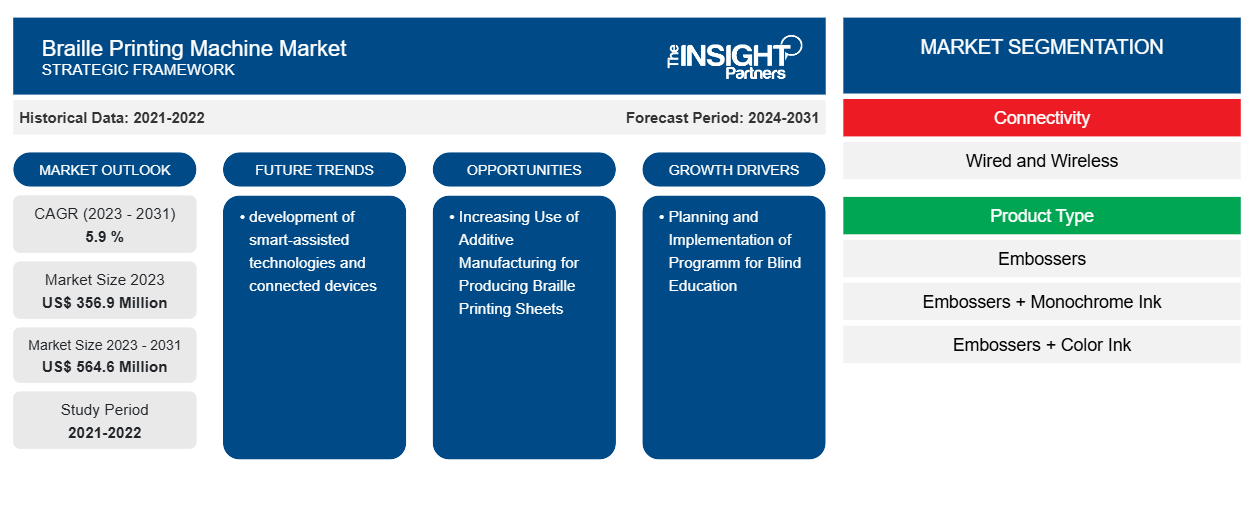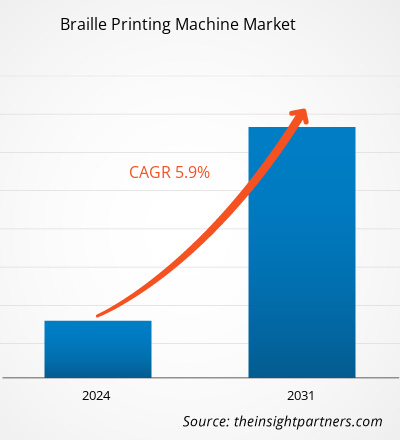Braille Printing Machine Market Trends and Analysis by 2031
Braille Printing Machine Market Size and Forecast (2021 - 2031), Global and Regional Share, Trend, and Growth Opportunity Analysis Report Coverage: By Connectivity (Wired and Wireless); Product Type (Embossers, Embossers + Monochrome Ink, and Embossers + Color Ink)and Geography
Historic Data: 2021-2022 | Base Year: 2023 | Forecast Period: 2024-2031- Report Date : Apr 2026
- Report Code : TIPRE00022010
- Category : Electronics and Semiconductor
- Status : Data Released
- Available Report Formats :


- No. of Pages : 150
The braille printing machine market size is projected to reach US$ 564.6 million by 2031 from US$ 356.9 million in 2023. The market is expected to register a CAGR of 5.9 % during 2023–2031. The development of smart-assisted technologies and connected devices is likely to remain a key trend in the market.
Braille Printing Machine Market Analysis
The braille printing machine is a printer attached to a computer that is used to produce a braille copy of text. A braille embosser may also be attached to braille note-taking devices for the same purpose. With the use of a braille embosser, a student can print a braille copy of their notes and writing work. The embossers require heavyweight paper, and most models print on just one side.
Braille Printing Machine Market Overview
Braille printers receive information from computer devices and emboss that information in braille onto paper through the use of solenoids that control embossing pins. Braille printers typically utilize more pages for the same amount of information as pages printed on a regular printer. Braille printers, also known as braille embossers, can make it much easier for blind people to print out readable documents if one has a vision impairment. From important documents to backup copies of letters and forms, a braille printer can be a useful addition to everyday life.
Customize This Report To Suit Your Requirement
Get FREE CUSTOMIZATIONBraille Printing Machine Market: Strategic Insights

-
Get Top Key Market Trends of this report.This FREE sample will include data analysis, ranging from market trends to estimates and forecasts.
Braille Printing Machine Market Drivers and Opportunities
Planning and Implementation of Programm for Blind Education to Favor Market
The NFB BELL Academy offers children with Braille and non-visual skills training through fun, hands-on learning activities. Depending on the location, activities are provided in a day program or residential location. The program is designed for blind and low-vision children ages four through twelve. Learn more about the NFB BELL Academy. However, Advocacy and Awareness, The National Association for the Blind Delhi, engages in advocacy efforts to raise awareness about the importance of inclusive education and to advocate for policies that support the rights of visually impaired students to receive quality education in mainstream settings. Such initiatives globally drive the growth of the market.
Increasing Use of Additive Manufacturing for Producing Braille Printing Sheets
Braille printing helps blind and vision-impaired people with reading, due to which it is being used everywhere. Printing Braille on packaging helps blind people to better orient themselves and obtain information. Particularly in the case of packaging for medicinal products, special labeling obligations apply - including in Braille. Due to its huge application, additive manufacturing is used to produce braille printing sheets. Thus, increasing the use of additive manufacturing for producing braille printing sheets creates a lucrative opportunity for the growth of the market.
Braille Printing Machine Market Report Segmentation Analysis
Key segments that contributed to the derivation of the braille printing machine market analysis are connectivity, product type, application, and sector.
- Based on the connectivity, the braille printing machine market is segmented as wired and wireless.
- Based on the product type, the braille printing machine market is segmented into embossers, embossers + monochrome ink, and embossers + color ink.
Braille Printing Machine Market Share Analysis by Geography
The geographic scope of the braille printing machine market report is mainly divided into five regions: North America, Asia Pacific, Europe, Middle East & Africa, and South & Central America. Organizations and individuals around the world have advocated for increased awareness of and accessibility to braille materials and technology. In 2021, advocates and experts in Cameroon celebrated World Braille Day (January 4th) with both activities and a rally. Reporters noted that “blind demonstrators said the braille system helps them further their education, establish their independence and reduce the need for support” and called for greater support for educators to learn “braille in teacher training institutions.”
Braille Printing Machine Market Report Scope
| Report Attribute | Details |
|---|---|
| Market size in 2023 | US$ 356.9 Million |
| Market Size by 2031 | US$ 564.6 Million |
| Global CAGR (2023 - 2031) | 5.9 % |
| Historical Data | 2021-2022 |
| Forecast period | 2024-2031 |
| Segments Covered |
By Connectivity
|
| Regions and Countries Covered |
North America
|
| Market leaders and key company profiles |
|
Braille Printing Machine Market Players Density: Understanding Its Impact on Business Dynamics
The Braille Printing Machine Market is growing rapidly, driven by increasing end-user demand due to factors such as evolving consumer preferences, technological advancements, and greater awareness of the product's benefits. As demand rises, businesses are expanding their offerings, innovating to meet consumer needs, and capitalizing on emerging trends, which further fuels market growth.

Braille Printing Machine Market News and Recent Developments
The braille printing machine market is evaluated by gathering qualitative and quantitative data post primary and secondary research, which includes important corporate publications, association data, and databases. A few of the developments in the braille printing machine market are listed below:
- Tecnovisão and HumanWare enter into a distribution partnership in Brazil. This partnership will allow HumanWare to share its innovative blindness and low-vision solutions with a larger number of customers in Brazil.
(Source: Tecnovisão, April 2021)
- Zychem Limited, in collaboration with its parent company, American Thermoform, American Thermoform is excited to introduce the Swell Form Pro, a state-of-the-art tactile graphics machine used to create educational products for the blind and visually impaired.
(Source: Zychem Limited, June 2024)
Braille Printing Machine Market Report Coverage and Deliverables
The “Braille Printing Machine Market Size and Forecast (2021–2031)” report provides a detailed analysis of the market covering below areas:
- Braille printing machine market size and forecast at global, regional, and country levels for all the key market segments covered under the scope
- Braille printing machine market trends, as well as market dynamics such as drivers, restraints, and key opportunities
- Detailed PEST/Porter’s Five Forces and SWOT analysis
- Braille printing machine market analysis covering key market trends, global and regional framework, major players, regulations, and recent market developments
- Industry landscape and competition analysis covering market concentration, heat map analysis, prominent players, and recent developments in the braille printing machine market
- Detailed company profiles
Frequently Asked Questions
Naveen is an experienced market research and consulting professional with over 9 years of expertise across custom, syndicated, and consulting projects. Currently serving as Associate Vice President, he has successfully managed stakeholders across the project value chain and has authored over 100 research reports and 30+ consulting assignments. His work spans across industrial and government projects, contributing significantly to client success and data-driven decision-making.
Naveen holds an Engineering degree in Electronics & Communication from VTU, Karnataka, and an MBA in Marketing & Operations from Manipal University. He has been an active IEEE member for 9 years, participating in conferences, technical symposiums, and volunteering at both section and regional levels. Prior to his current role, he worked as an Associate Strategic Consultant at IndustryARC and as an Industrial Server Consultant at Hewlett Packard (HP Global).
- Historical Analysis (2 Years), Base Year, Forecast (7 Years) with CAGR
- PEST and SWOT Analysis
- Market Size Value / Volume - Global, Regional, Country
- Industry and Competitive Landscape
- Excel Dataset
Recent Reports
Testimonials
The Insight Partners' SCADA System Market report is comprehensive, with valuable insights on current trends and future forecasts. The team was highly professional, responsive, and supportive throughout. We are very satisfied and highly recommend their services.
RAN KEDEM Partner, Reali Technologies LTDsI requested a report on a very specific software market and the team produced the report in a few days. The information was very relevant and well presented. I then requested some changes and additions to the report. The team was again very responsive and I got the final report in less than a week.
JEAN-HERVE JENN Chairman, Future AnalyticaWe worked with The Insight Partners for an important market study and forecast. They gave us clear insights into opportunities and risks, which helped shape our plans. Their research was easy to use and based on solid data. It helped us make smart, confident decisions. We highly recommend them.
PIYUSH NAGPAL Sr. Vice President, High Beam GlobalThe Insight Partners delivered insightful, well-structured market research with strong domain expertise. Their team was professional and responsive throughout. The user-friendly website made accessing industry reports seamless. We highly recommend them for reliable, high-quality research services
YUKIHIKO ADACHI CEO, Deep Blue, LLC.This is the first time I have purchased a market report from The Insight Partners.While I was unsure at first, I visited their web site and felt more comfortable to take the risk and purchase a market report.I am completely satisfied with the quality of the report and customer service. I had several questions and comments with the initial report, but after a couple of dialogs over email with their analyst I believe I have a report that I can use as input to our strategic planning process.Thank you so much for taking the extra time and making this a positive experience.I will definitely recommend your service to others and you will be my first call when we need further market data.
JOHN SUZUKI President and Chief Executive Officer, Board Director, BK TechnologiesI wish to appreciate your support and the professionalism you displayed in the course of attending to my request for information regarding to infectious disease IVD market in Nigeria. I appreciate your patience, your guidance, and the fact that you were willing to offer a discount, which eventually made it possible for us to close a deal. I look forward to engaging The Insight Partners in the future, all thanks to the impression you have created in me as a result of this first encounter.
DR CHIJIOKE ONYIA MANAGING DIRECTOR, PineCrest Healthcare Ltd.Reason to Buy
- Informed Decision-Making
- Understanding Market Dynamics
- Competitive Analysis
- Identifying Emerging Markets
- Customer Insights
- Market Forecasts
- Risk Mitigation
- Boosting Operational Efficiency
- Strategic Planning
- Investment Justification
- Tracking Industry Innovations
- Aligning with Regulatory Trends





 Get Free Sample For
Get Free Sample For